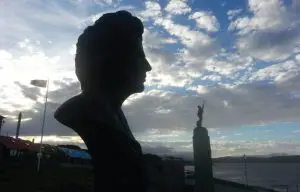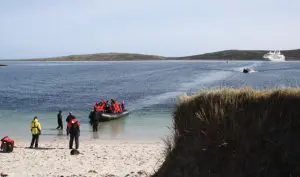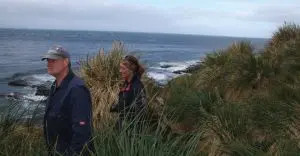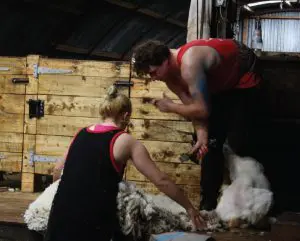
From my vantage point in the corner, it’s good sport to watch the cruise-ship tourists enter the café, iPads in hand, only to discover there’s no free Wi-Fi on offer. In fact, there’s no free Wi-Fi to be found anywhere in Stanley, this capital of the British overseas territory of the Falkland Islands.
The day is classic Falklands. Outside, the muscular winds shift and flex, leaving you constantly recalibrating your balance. The Antarctic-bound travellers are identically dressed in orangey-yellow expedition jackets. Tour leaders are distinguishable in red. They disembark like colourful eggs in inflatable cartons that will bob back and forth all day to the ship anchored in Blanco Bay. Once on land, and disavowed of their digital entitlement, the tourists dutifully line up to buy Wi-Fi cards. They marvel at the Falkland Island pounds they receive as change, pegged to Sterling but useless elsewhere as anything but a curiosity.

Tourism represents a third economic wave for the Falklands, which was dominated for its first one hundred-plus years by wool exports. The next thirty-five were made robust from the sale of fishing licenses, largely for squid. While in the Falklands, tourists will likely visit a penguin colony—five different species live here—or marvel at the elephant seals, black-browed albatross and other wildlife. In Halifax, where I live, giant coaches line up on cruise days to take tourists on excursions. If Falkland tourists go critter spotting they will typically be driven in one of dozens of Land Rovers heading overland, for lack of road infrastructure. What they may not realize is that the person at the wheel of their tour is probably a local farmer.
The rise of tourism has also provided an important diversification opportunity for Falkland farmers, who only gained control of their own land fairly recently. Before the 1980s, many Falklanders were employed as shepherds or other workers on large, absentee-owned farms, each of which supported a small settlement. Due to their isolation, the role of farm managers was much like that of a ship’s captain: in addition to running the farm, managers performed marriages and burials and also handled disruptive behaviour (in some cases simply by limiting access to alcohol).
After the 1982 Falkland conflict between Argentina and Britain, a UK government report suggested the land be subdivided and made available for local ownership. The report’s author, Lord Shackleton, hoped this would help to repopulate camp (the countryside, from the Spanish campo) and reverse the trend of locals turning to service work for the strengthened garrison force, infrastructure development, and rebuilding after the fighting ended. Over the next decade and a half, farms were subdivided and sold to locals who “put in” for specific, family-sized sections. It didn’t work. People drained from the camp settlements regardless; it turned out family-sized farms could not support employees.
Military history looms large in the memory of this small population, barely three thousand strong. In 1982, they were invaded by Argentine forces and occupied for seventy-four days. Nearly nine hundred soldiers died, as did three civilians. Graham Bound, in his 2001 book Falkland Islanders at War, describes the ordeal and the sometimes heroic roles locals played in their own liberation by UK forces. Bookstores in the Falklands groan with military titles about the recent conflict and the 1914 Battle of the Falkland Islands, a German-British naval action carried out during the First World War. Every possible anniversary is remembered with military marches and ceremonies, at which the governor parades, his richly plumed helmet guttering in the sub-Antarctic wind.
The Falkland conflict inspires particular fervour at home and abroad. Visitor statistics reveal distinct peaks every five years since 1982. For locals, however, the conflict is not a matter of history. Argentina continues to claim the Falklands, which they call Las Islas Malvinas. It is a local call to ring the Falklands from the mainland. Every month, the LATAM Chile flight from Punta Arenas stops in Rio Gallegos, Argentina, and is boarded by those seeking to visit sites such as the official Argentine military cemetery at Darwin. Graffitiing and stunting with the Argentinian flag, which perpetrators later post on sites like Flickr and Facebook, is a regular occurrence, and locals are often uneasy in anticipation of it until the return flight a week later. Genuine tensions remain. “Argies,” (the local term for Argentines), is generally uttered with a grimace by Falklanders; “squaddies,” young members of the British Forces down on rotation, with a smile and indulgent shake of the head. Margaret Thatcher may be more fondly remembered in the Falklands than anywhere else.

Tourists come for the penguins, history buffs for the war sites. I’m here for the farms. The Organization for Economic Co-operation and Development (OECD) funded me to research the Islands’ agricultural sector. I want to learn how farming might restore ecosystems, rather than using them up. For decades, farms across the Falklands were managed under absentee ownership, including hands-off ranching for wool production that allows sheep to eat the good stuff and weeds to spread. Local farmers are trying lots of new things to cope with that legacy as well as with new challenges like market shifts and a drying climate. Some places, especially the outer islands, were destocked. Some are using artificial improvements like re-seeding and diversifying into beef for the new government-funded abbatoir that has created a local source for meat. Other farmers are trying to regenerate the land by moving sheep around smaller pastures to allow grasses to recover, or by replanting the two-metre-high tussac grasses that fringed the islands before they were grazed out.
Frankly, the jury is still out on how to best manage this marginal, peaty landscape. It’s difficult to import solutions from elsewhere, though Falklanders do rely on government agricultural advisors who come on contract from Australia. When I first visited, in 2015, I saw sheep grazing among penguins in what looked like an eroded coastal area and wondered why the sheep weren’t fenced out of it. The farmers I spoke to on my most recent trip suggested that coastal access might in fact be the key to a viable farm. All said their coastal flats best support lambing, because penguins carry nutrients from the sea and destroy weeds. Sheep also visit the shore, where they nibble seaweed like vitamins to compensate for soil deficiencies. Excluding animals might help re-establish tussac, but it costs farmers in lamb mortality. Bones strewn across greens and shorelines stand as testament to how hard it is to be a sheep in the Falklands’ exposed, treeless landscape.
Despite Lord Shackleton’s hopes, farmers constantly compete for labour in the Falklands. Many young shearers are lured by easier work driving tourists or building and maintaining roads. I arrived during shearing season, the busiest time on the farming calendar. Only two crews were working their way through the islands’ half-million animals, and they were well behind schedule. Shearing crews live with the farmers who employ them. Laundry, meals, and all the Budweiser they can drink are part of the deal. Shearers are paid per sheep. A good host is one who “always has sheep in the pens,” as Barry Cockburn, a jovial Scottish shearer, put it. There was a shearer shortage when I visited, and older farmers, many of whom were professional shearers in their youth, drove great distances and worked long hours to help each other out. The day we were to head to North Camp we learned that a farmer in the area, Arthur Turner, had died early that morning while driving to help his neighbour shear. This death in the closely-knit camp community, only a few hundred strong, cast a pall everywhere. Drizzle painted everything grey. We headed south instead, and met on the way a sombre, slow convoy of emergency vehicles returning to town with Mr. Turner’s ruined truck.
Shearing culture in the Falklands shares similarities with hockey culture in Canada. I grew up in a small New Brunswick town that was endlessly preoccupied with the fate of the high-school boys’ hockey team. In the Falklands, I visited Stanley House, where the camp kids go to board so they can finish out their grade ten. Up to age ten they’ll have done lessons by phone with a teacher who visits each of a handful of families for a week on rotation. The Stanley House kids all knew who the best shearers were. A few had started shearing themselves. The kids could spout individual shearers’ statistics (“so-and-so does 250 a day”) and even gossiped about which “rousies” the shearers were reputedly getting around with. Rousies are called “wool girls” by the older farmers, as they’re usually women. They earn less than shearers yet support two shearers each through their work collecting and trimming fleeces for the wool classer to assess. They’re also tasked with generally keeping things clean. Young Falkland shearers and rousies travel the world following shearing seasons, often while they wait for a farm to become available at home.

When I visited the Falklands, the biggest controversy was not about shearing but about telecommunications. The Falklands are remote but rich thanks to the sale of squid-fishing licenses for their coastal waters. Given this wealth, locals are frustrated by their internet provider’s government-granted monopoly. For such a small population, the Falklands are unusually well supplied with media: they have a newspaper, a radio station, a TV station, as well as British Forces’ media. I was charmed by regular shipping forecasts and weather reports that quantified “risk to newly shorn sheep.” After requesting a flight on the government’s fleet of eight-seater planes, prospective passengers tune in to the radio the evening before to learn who will be on their plane and when they should be at the airstrip. Given their isolation, Falklanders are heavy Facebook and FaceTime users, and resent the cost, bandwidth, and download limits of their service. For a visitor, Falklands internet requires new manners: you’d no more ask someone to access internet in their home than you’d ask them for cash. One long-time resident told me she felt like she was “in a bubble” when a phone app surreptitiously drained her data allocation in a single week and she was unable to FaceTime her adult son overseas.
I would hesitate to say this to a Falklander, but there may be advantages to expensive internet. People meet your eyes on the street in Stanley, rather than staring at phones. Pub debates don’t culminate in googling. Residents disable Java so pop-up videos don’t launch and use up precious bandwidth. When you do have web access you do what you need to do quickly then get off. Slow, expensive internet may also account for why print is so cherished. When I interviewed them, farmers would often leave the room to fetch me a book. Some were histories of the area, such as Mary Trehearne’s 1978 volume, Falklands Heritage: A Record of Pioneer Settlement and the 2008 Dictionary of Falklands Biography (Including South Georgia) edited and published by David Tatham. Other books were about farming, such as a 1993 volume by Summers and McAdam, The Upland Goose: A Study of the Interaction Between Geese, Sheep and Man in the Falkland Islands or Jim Gerrish’s 2004 Managed Intensive Grazing: The Grassroots of Grass Farming. Print culture survives, but relies heavily on online bookstores.
I left the Falklands with a new sense of the limitations of my academic “specialist” approach to life. Camp residents have to be generalists, but also inventive. Everyone in camp knows how to maintain their vehicles, to gather sheep, to help with shearing, and the value of things that town people throw away. Imports are expensive, so materials are re-used. Local solutions are found for other problems, too. Most farms have wind turbines, but peat is also still cut, dried, and burned for heating and cooking. Allocations exist for the harvest and consumption of penguin eggs and young upland geese. Calcified seaweed deposits are mined for fertilizer. Every northern window is blocked by a tomato plant growing from a bag of potting soil, regardless of how stunning the view. Vegetables are otherwise in short supply. I was in Stanley the day a ship finally arrived from Chile with fresh fruit and vegetables, having been delayed a few weeks by a strike at the docks there. It’s not everywhere fresh produce causes a mid-morning traffic jam.

Camp residents are tough as well as community-minded. The physical isolation and discomforts of the Falklands are very real, but have their compensations. People gather you in. They put you up in their homes, and do amazing things with mutton. Farmers informally trade skills and time. When a plane lands with mail, someone takes it to a nearby shed to sort into cardboard boxes for each farm, and will take it along for delivery to any they happen to be passing. “Can we bring you anything from town?” was a frequent refrain from my local research assistant, Marilou. Many of the people I talked with really missed the old settlement days. They recalled with delight the “doctor’s hour” on the old two-metre radio system where everyone could listen in on symptoms and diagnoses. I heard many stories of close medical calls, with evacuations to Stanley or to Uruguay for complex cases. Extended hospital stays were supported by neighbours pitching in to help move stock.
As my mind turned to home, and my two young children, I realized that above all I was in awe of camp mothers and the children they produced. I felt like a weak intellectual alongside these strong women, who were not only physically able but emotionally resilient. They endured uncertainty about the availability of medical help for their children, and losing them so young when they went to board in town or onward to government-funded high school in England or elsewhere. Those kids, in turn, look you square in the eye when they meet you. They pull up a chair to talk. They are used to working (and playing) alongside adults and being respected for the real contributions they make to the farm. Meeting those kids made it seem like the trade-offs of camp life were well compensated. Back in Stanley, the spell cast on me by my time in camp was sustained by the distinctive smell of peat smoke, used in town to heat their “tunnels” (greenhouses). I wish there were some way to bottle that aroma. I miss it now.
—From CNQ 101 (Winter 2018)
